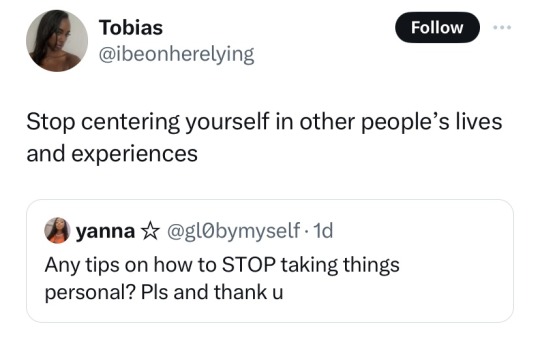#Quick Tips
Explore tagged Tumblr posts
Text
Forgetting your character is disabled isn't a "good representation" flex: Writing Disability Quick Tips
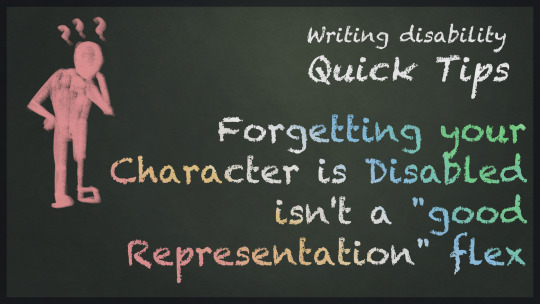
[ID: An image with “Writing Disability quick tips: Forgetting your character is disabled isn't a good representation flex” written in chalk the colour of the disability pride flag, from left to right, red, yellow, white, blue and green. Beside the text is a poorly drawn man in red chalk looking down confused at his leg, one is drawn normally, the other is drawn to resemble a basic prosthetic. He has question marks above his head. /End ID]
For a while, I was involved in the booktok and Tik Tok writing communities, specifically parts of the community focused on more diverse books and authors. During this time, I noticed a reoccurring pattern when people were highlighting stories featuring disabled characters, or even promoting their own books, and that was how often people would say "I kind of forget they have [insert disability here] because they're such a badass."
The intention behind this statement is (usually) good, with people trying to show that their disabled characters are self-sufficient and don't fall into the tired old sad/helpless disabled person trope, however, you can - and very much should - do that without erasing your character's disability. If you find yourself forgetting your character is disabled, or your beta and pre-release readers are commenting about forgetting it, then there's a good chance that's exactly what you've done - and as a disabled person myself, if I see that statement being used in your marketing in particular, it's a giant red flag and a sure fire way to make sure I give the book in question a skip.
Remember, disabilities (especially major ones) are a part of your character's identity, and they're important regardless of the character's personal relationship with it. Even if your character doesn't specifically identify with the label of disabled or doesn't really care that much, it's should still be impacting their daily life, even in small ways. If you're finding yourself forgetting about a major part of your character's identity, it might be a good idea to check and make sure their disability is having an impact on the character.
I see this comment most often with amputee characters, and to me, it's a pretty consistently good indication that the author has treated their character's prosthetic as a cure rather than the mobility aid it is. It's far from unique to amputees, mind you (I talked about this a lot when I was discussing the character of Toph from Avatar), but it's when I tend to see it the most. Remember that mobility aids and other forms of assistive technology and assistive magic (if it's a fantasy story) are just that: they're aids, they assist, they shouldn't be cures.
Of course, this wasn't unique to Booktok, I've seen it on nearly every other social media site with a writing and book-focused community at some point, but Tik Tok was just where I spent the most time and it seems to be where I see the most people specifically gloating about it.
#Writing disability with Cy Cyborg#Quick tips#Disability#Disabled#Disability Representation#Writing Disability#Writing#Writeblr#Authors#Creators#Writing Advice#Disabled Characters#On Writing#book marketing
1K notes
·
View notes
Text
product review: this stuff

Use it like the instructions say and it will do with the instructions say it does. Really, that's all you can want out of a product.
Mary Ellen's I Hate Ironing spray is likely to be available at places that sell Mary Ellen's Best Press, so call your local small-business sewing and quilting stores and ask them if they carry it.
You can probably get it from Bezos if you have to.
157 notes
·
View notes
Text
Three tricks to avoid plot armour
Plot armour can be difficult to avoid. We get so attached to our characters that hurting them in any way feels like a betrayal.
But plot armour is detrimental to any good narrative. Having your characters avoid harm, whether that be emotional or physical, means that there aren't any stakes. And without stakes, it's difficult for readers to invest.
There are three simple things you can use to avoid plot armour:
🔵 Injury 🔵 Sacrifice 🔵 Consequence
In every conflict, make sure the resolution contains at least one of these things.
If you don't want to injure your characters, make sure that they sacrifice something, whether that be someone, or an object. If they don't sacrifice anything, make sure there is a consequence. That consequence can be a loss, an emotional wound, or simply a blow to their reputation. The important thing is that your character doesn't remain unscathed by their experience, and they walk out somehow changed.
#nanowrimo#writers#creative writing#writing#writing community#writers of tumblr#creative writers#writing inspiration#writeblr#writerblr#writing tips#writblr#writers corner#plot armor#writing plot#plot bunny#writing resources#quick tips#writing quick tips#writing help#helping writers#help for writers#learn to write#advice for authors#writing advice#writing tips and tricks#story inspiration#let's write#how to write#writers on tumblr
2K notes
·
View notes
Text
This is really hard to continue. If I give up on either living or building a life, they will happily slander me standing on my grave. I wanna choke them with my laughter.
#motivation#thoughts#quick tips#quotes#poetry#writing#original#lit#prose#spilled ink#inspiring quotes#life quotes#quoteoftheday#aesthetic#life#life quote#get motivated#writeblr#writers on tumblr#writers#mindset#personal growth#success#inspirational#personal development#writters on tumblr
21 notes
·
View notes
Text
Quick Tips 13
No, all endos do not have "trauma they don't remember", and in the cases of those that do, you should shove a rusty tire iron up your ass if you think they need to remember it to be a valid system. I would think that you, the ""superior traumagenic who cannot possibly be fake in their plurality"" would know EXACTLY how dangerous it is to confront trauma that you're not ready for. Do you want them to become a statistic? Because that's how you turn members of your own community into a statistic.
16 notes
·
View notes
Note
how do you draw hands so well (I'm asking for a tut pretty please)
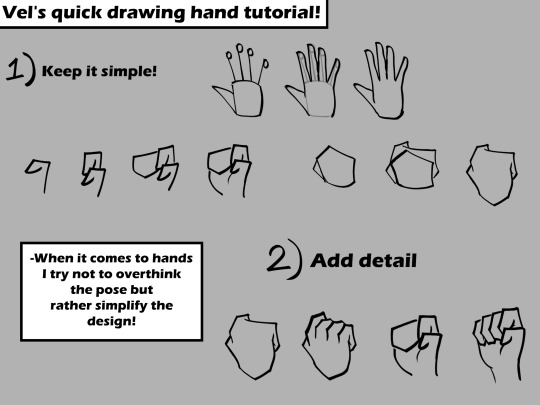
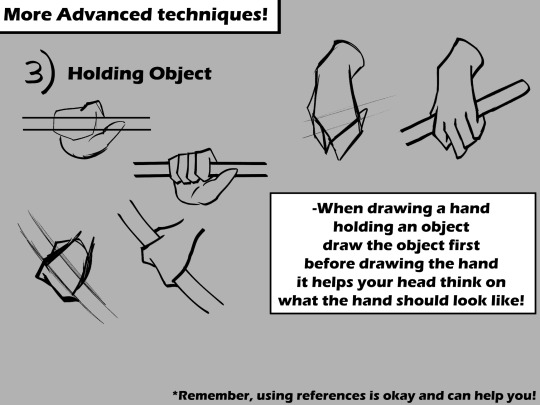
I'm not the best at making tutorials, but to whomever asked, here you go! 😭
Hopefully, it's good enough 😭👍
#art#digital art#eepyposting#artists on tumblr#drawing#artwork#sketch#art tutorial#tutorial#quick sketch#quick tips
16 notes
·
View notes
Text
Quick Tips - How to focus when your cat wants to play
Blast music, they can't distract you if you can't hear them
Realize that they might eat or break something if you're not paying attention
Feel bad about ignoring your cat
Play time
3 notes
·
View notes
Text
ok @ ppl who are shidding their pants at all the ai garbage in google image searches, well first of all use duck duck go for most things anyway BUT their image indexing is kinda mid so if you have to use google, just slap 'before:2020' (or any other previous year) after your search. no ai images, nilch. no half working adblock datalist just one parameter. I did a quick test to see if it can also help me find old school digital art and dude... the fuckign difference
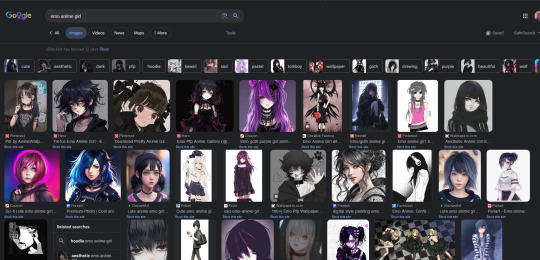
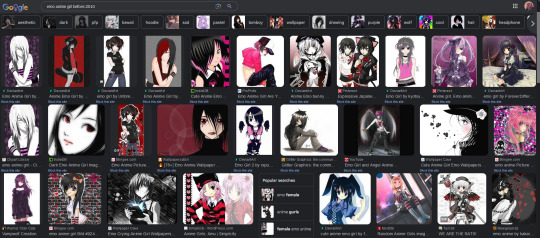
#no ai#google#quick tips#from nix#man ive been having such a hard time finding old web art and images how did i not think of this earlier rip#im dumb XD#90% of all ai images were made after 2020 maybe 2019#so its def does a huge help to cull them#idk how well it will work going forward but so far seems pretty successful
10 notes
·
View notes
Text
How your disabled character's allies react to their disability can make or break the representation in your story: Writing Disability Quick Tips
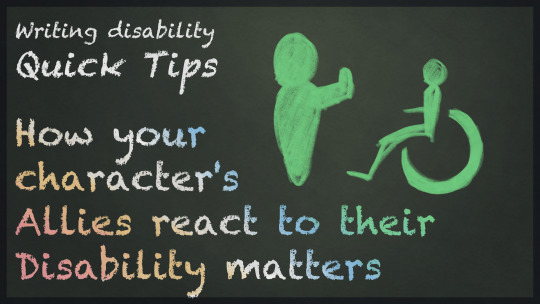
[ID: An image with “Writing Disability quick tips: How your character's allies react to their disability matters” written in chalk the colour of the disability pride flag, from left to right, red, yellow, white, blue and green. Beside the text are 2 poorly drawn people icons in green, one is standing with their hand up to the face of the other, who is in a wheelchair. /End ID]
Something I brought up in my big post about Toph Beifong was how the other characters reacted to Toph pointing out that things were not accessible to her and setting boundaries regarding her disability, which were ignored. I had more to say about it than I thought I did, as it turns out (when isn't that the case lol) but I feel like this is an important aspect of disability representation that is all too often over looked.
You can write the best, most accurate portrayal of a specific disability ever put to screen or page, but it won't mean much if all the other characters, specifically those we're supposed to like and empathise with, treat your character terribly for being disabled and having needs relating to said disability, especially if the story justifies their behaviour.
You see this most often with autistic characters and especially autistic-coded characters. The character in question will be given a bunch of autistic traits, most often traits relating to not understanding certain social dynamics or sarcasm, and when they get it wrong, the other characters we are supposed to like jump down their throat, tease them or outright abandon them. Autism isn't the only disability that gets treated this way, but it is one of the more common ones that get this treatment. It doesn't matter if you do everything else right when creating an autistic character if the other "good guys" constantly call them annoying, get angry at them or laugh at them for the very traits that make them autistic, or for advocating for their needs.
Likewise, if you have a leg amputee character who is otherwise done well, but is constantly being criticised by their allies for needing to rest their legs or taking too long to get their prosthetics on, it undermines a lot of the other work you've done. Same goes for having a wheelchair user who is accused of being a bore or a stick in the mud because they point out the places their friends want to go to on a group holiday have no wheelchair access, or a deaf character who is accused of being entitled for wanting their family to learn to sign, or anything else.
This isn't to say you can never have moments like these in your stories, but its important to remember that a) people with the same disability as your character will be in your audience. If you spend a whole season of your TV show shaming your autistic character for real traits that real autistic people have, they're not exactly going to feel welcome and may not want to hang around. b) it's going to very, very heavily impact people's perceptions of your "heros" who do this, especially in they eyes of your audience members who share the character's disability or who have had similar experiences. This isn't like calling someone a mean name or being a bit of a dick when you're sleepy, it's going to take a lot to regain audience appeal for the offending character, and depending on exactly what they do and how frequently they do it, they may not even be able to come back from it at all. And finally, c) there should be a point to it outside of just shaming this character and saying the other guy is an asshole. Like I said before, you're character is criticising real people's real disabilities and the traits or problems that come with them, things that they often have no control over, it shouldn't be used as a cheap, quick way to establish a quirky enemies to lovers dynamic or show that one guy is kind of an ass before his redemption arc. If you really must have your characters do this, be mindful of when and how you use it.
#Writing disability with Cy Cyborg#Quick tips#Disability#Disabled#Disability Representation#Writing Disability#Writing#Writeblr#Authors#Creators#Writing Advice#Disabled Characters#On Writing
760 notes
·
View notes
Text
I don't know who needs to hear this but
Most non woven interfacing still has a grain line and you need to line your pieces up with it
139 notes
·
View notes
Text
Don't be afraid to use your character's name!
To avoid repetition, new writers will often resort to descriptions like "the tall woman," or "the dark-haired man", which breaks up narrative flow and reads as unnatural. Don't over-describe, when just a name will do.
#nanowrimo#writing quick tips#writers#creative writing#writing#writing community#writers of tumblr#creative writers#writing inspiration#writeblr#writerblr#writing tips#quick tips#character development#writing advice#advice for writers#writing tip
918 notes
·
View notes
Text

Especially air drying jeans, it can sustain them longer
96 notes
·
View notes
Text
If you're struggling with a lack of attention, depression, or anxiety, even small tasks can feel overwhelming. Here are quick, actionable tips to help you manage and take small steps forward:
1. Break Tasks into Micro-Steps
Why: Large tasks feel daunting. Breaking them into tiny, manageable steps makes them less intimidating.
How: Instead of "clean the house," start with "put one dish in the sink" or "pick up one piece of clothing."
2. Use the "2-Minute Rule"
Why: Starting is often the hardest part. If something takes less than 2 minutes, do it immediately.
How: Examples: reply to a short email, put away one item, or write down one task for the day.
3. Set a Timer (Pomodoro Technique)
Why: Short bursts of focus are easier to handle than long stretches.
How: Set a timer for 5-10 minutes. Work on a task until the timer goes off, then take a break. Repeat.
4. Prioritize Self-Care
Why: Depression and anxiety drain your energy. Taking care of your basic needs can improve your mood and focus.
How:
Drink water.
Eat something nutritious.
Take a short walk or stretch.
Rest if you need to—it’s okay to take a break.
5. Write It Down
Why: Anxiety often comes from overthinking. Writing things down can help clear your mind.
How:
Keep a "brain dump" journal for all your thoughts.
Make a simple to-do list with 1-3 small tasks for the day.
6. Focus on "Good Enough"
Why: Perfectionism can paralyze you. Aim for progress, not perfection.
How: Remind yourself that doing something is better than doing nothing, even if it’s not perfect.
7. Use Visual Cues
Why: Visual reminders can help you stay on track when your mind feels scattered.
How:
Stick Post-it notes with reminders in visible places.
Use a whiteboard or planner to track tasks.
8. Celebrate Small Wins
Why: Acknowledging progress, no matter how small, can boost motivation.
How: Celebrate completing a task, even if it’s just getting out of bed or brushing your teeth.
9. Limit Distractions
Why: Lack of attention makes it easy to get sidetracked.
How:
Turn off notifications on your phone.
Work in a quiet, clutter-free space.
Use apps like Forest or Focus Keeper to stay on track.
10. Practice Grounding Techniques
Why: Anxiety can make it hard to focus. Grounding techniques help bring you back to the present.
How:
5-4-3-2-1 Method: Name 5 things you see, 4 you can touch, 3 you hear, 2 you smell, and 1 you taste.
Take deep breaths: Inhale for 4 counts, hold for 4 counts, exhale for 6 counts.
11. Ask for Help
Why: You don’t have to do everything alone. Reaching out can lighten the load.
How:
Ask a friend or family member to help with a task.
Consider therapy or counseling for professional support.
12. Be Kind to Yourself
Why: Depression and anxiety are hard. Beating yourself up only makes it worse.
How:
Remind yourself that it’s okay to struggle.
Treat yourself with the same compassion you’d show a friend.
13. Create a "Done List"
Why: On tough days, it’s easy to feel like you’ve accomplished nothing. A "done list" helps you see your progress.
How: At the end of the day, write down everything you did, no matter how small (e.g., showered, ate breakfast, replied to a text).
14. Use Music or Background Noise
Why: Music or calming sounds can help improve focus and reduce anxiety.
How:
Listen to lo-fi beats, classical music, or nature sounds.
Try apps like Calm or Noisli for background noise.
15. Start with the Easiest Task
Why: Completing a small task can give you momentum to tackle bigger ones.
How: Look at your to-do list and pick the easiest thing to start with.
16. Visualize the End Result
Why: Focusing on the positive outcome can motivate you to take action.
How: Picture how good it will feel to complete a task or reach a goal.
17. Practice Mindfulness
Why: Mindfulness can help reduce anxiety and improve focus.
How:
Spend 1-2 minutes focusing on your breath.
Use apps like Headspace or Insight Timer for guided meditations.
18. Reward Yourself
Why: Rewards can make tasks feel less overwhelming.
How: Promise yourself a treat (e.g., a favorite snack, a TV show, or a nap) after completing a task.
19. Keep It Simple
Why: Overcomplicating things can lead to procrastination.
How: Focus on one thing at a time and avoid multitasking.
20. Remember: Progress, Not Perfection
Why: Small steps add up over time. You don’t have to do everything at once.
How: Focus on what you can do today, even if it’s just one small thing.
You’re not alone, and it’s okay to take things one step at a time. Be patient with yourself, and celebrate every bit of progress, no matter how small. You’ve got this! 🌟 HUGS!
#motivation#thoughts#quick tips#depression and anxiety#adhd#adhd brain#quotes#poetry#literature#relationship quotes#writing#original#words#love#relationship#lit#prose#spilled ink#inspiring quotes#life quotes#quoteoftheday#love quotes#poem#aesthetic#life#life quote#get motivated#writeblr#writers on tumblr#writers
8 notes
·
View notes
Text
Optional Chaining in JavaScript
Introduced in ECMAScript 2020, Optional Chaining is a a modern feature in JavaScript that allows you to read the value of a property located deep within a chain of nested object properties, without having to explicitly validate each reference in the chain. This simplifies the process of handling potential null or undefined values without the need for cumbersome and error-prone conditional…
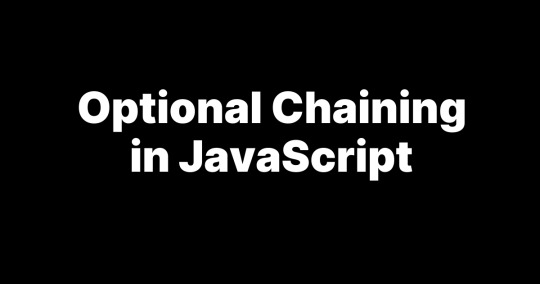
View On WordPress
8 notes
·
View notes
Video
youtube
Quick Tips Apply Transfers for tabletop wargaming miniatures #paintingwa...
#youtube#way of the brush#tutorial#painting#mini painting#painting warhammer#bretonnia#decals#quick tips#just the tip#fresh tips#tabletop gaming#miniature wargaming
5 notes
·
View notes
